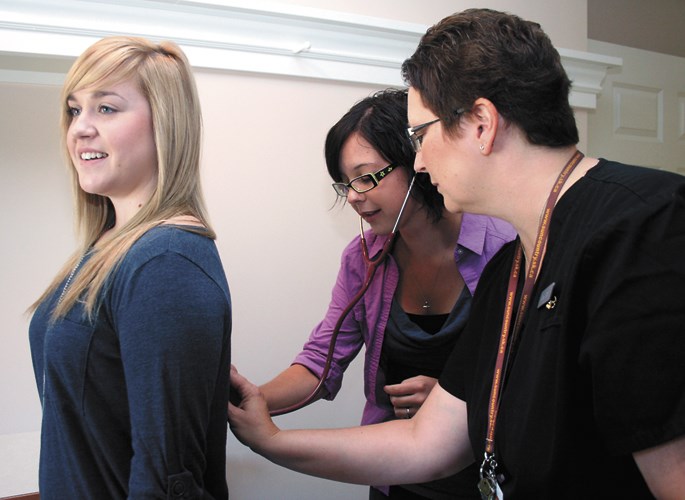High school students from around the southeast converged on the Tatagwa View care centre in Weyburn on Thursday to learn more about exploring health care professions, and to sign up for a mentorship program in the coming months.
The Pre-Health Professions Club held the mentorship orientation for students from the Southeast Cornerstone School Division, in cooperation with the Sun Country Health Region and the University of Saskatchewan.
The stated purpose of the club is "to provide learning experiences for high school students to explore careers in medicine, nursing, pharmacy, nutrition and physical therapy beyond the classroom and into a realistic setting."
This was the second session, with the first one being an introduction by Sun Country, with some health care professionals on hand who talked about their professions.
The students learned on Thursday what will be involved in their eight-hour mentorship session in the health care profession of their choice. The mentorship experience will take place in either October or November.
"Following this session, we will match them up with a mentor in the profession they would like to follow," said Christel Gee of the University of Saskatchewan, the Pre-Health Professions coordinator.
The students, who were present from Weyburn, Pangman, Estevan, Maryfield, Stoughton, Kipling and Arcola (some by tele-conference), were told their mentors are health care professionals who volunteer their time to be with the students for an eight-hour period.
"We'll also do a follow-up after they graduate, to see whether they're into nursing or medicine or pharmacy. The health region is providing the environment where they experience the profession and see what's involved with it," said Gee.
RNs Stella Swertz and Kim Balog talked about what some of the expectations are for the students, and encouraged them to ask lots of questions and be curious about the profession they're checking out.
"The goal of the program is to provide students with the opportunity to observe the work of a doctor, nurse, pharmacist or therapist. It's a big step, and you might not be sure what you're looking at down the road. We're going to try and capture a glimpse of what that profession will be like," said Balog.
"We strive for the patient first, and patient safety," she added. "Your pathway is to be an active learner, and come away with observations you make in the workplace, such as how is the professional relating to the patient? You're also going to see a lot of equipment used, and what functions they do. It's amazing technology out there; the world of technology is booming, and you're going to see how to relates to patients. You're going to see some procedures."
The expected outcomes of the program include giving the students a chance to interact with a health professional, while observing them in their work environment. The students were encouraged to ask many questions, such as what classes or training was required to get into this field.
"Make sure you come with these kinds of questions. They (the professionals) are a wealth of information and will help you," said Balog, noting the mentors are volunteers who are hand-picked by the managers at Sun Country Health Region.
She noted besides the academic requirements, other requirements include having social skills to relate to patients and to other staff.
"When you go into the work site, there's a lot of collaboration. They function as a team, so you'll see a lot of interaction. You'll probably see a lot of that in these health care settings," added Gee. "You'll get a broader picture of what's involved with nursing or whatever profession you choose. Everybody's going to want to show you something."
Swertz explained the students need to be punctual and timely when they schedule a mentorship time, and advised the students to leave their cell phones at home.
A major consideration that students will have to keep in mind is the confidentiality of the patient, including any information about their medical condition.
"We're involved in their medical lives, and in their private lives, and that has to stay within the four walls," said Swertz, adding they can't text about it or post it on a site like Facebook or Twitter. Gee agreed, and noted that it has happened where slips are made, but the importance of maintaining confidentiality was emphasized.
As health care facilities are multi-disciplinary work places, respect of those who work there as well as of the patients is also of utmost importance, said Swertz, as there are considerations such as severe allergies to scents and perfumes, and people from many different cultures, both as health care workers and as patients.
Not to scare the students, said Swertz, she added, "You will get invited to do some pretty interesting things in our environment. We love to teach, and I think you'll get some unusual experiences with us."
"What's important to us is for you to have a good mentorship experience," said Gee.
